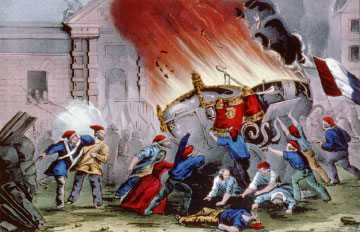French Revolution

The spring of 1789 saw a tide of popular uprisings across Paris. The leaders of this revolution constructed a new government, the National Assembly, which formally adopted the “Declaration of the Rights of Man” in August of that year. The declaration asserted that “All men are born and remain free and equal in rights.” The fate of enslaved people in France’s American colonies remained uncertain.
The National Assembly faced lobbying from groups in support of slave owners and commercial interests and those favoring abolition, particularly the Friends of the Blacks or les Amis des Noirs. The Amis des Noirs argued for granting full rights to Africans and biracial people in the colonies who were already free and pressed for stopping the slave trade—two ideas they hoped would not be too controversial. The French merchant community engaged in a vigorous public and private campaign to preserve the institution.
Free people of color from the colonies explained to the Assembly that despite their legal freedom, they could not enjoy the full rights due to citizens of the French Republic. Former slaves described the sufferings of the middle passage and the brutality of the plantation regime. After rounds of debate and political maneuvering, the commercial interest succeeded in blocking any clear assertion of rights and freedom for people of African descent in the colonies for several years.
The growing revolution in Saint-Domingue finally forced the National Assembly to reevaluate its position. Representatives from Saint-Domingue passionately described enslaved people’s literal battles for freedom and justice. In February 1794, the French republic outlawed slavery in its colonies. Revolutionaries in Saint-Domingue secured not only their own freedom, but that of their French colonial counterparts, too.
After Napoleon Bonaparte wrested control of revolutionary France, he sought to reconstruct a French Empire. In May of 1802 he restored slavery and the slave trade in France and its colonies, spurring new waves of violence in the Caribbean. France finally prohibited slave trafficking in 1817, but maintained the legal structures of slavery until 1848.
History & Memory
Related Pages:
-
 François Makandal
François Makandal
-
 Cap-Français
Cap-Français
-
 Museum of Aquitaine
Museum of Aquitaine
-
 Chateau de Joux
Chateau de Joux
-
 Logbook of the Bordeaux slaver Le Patriote
Logbook of the Bordeaux slaver Le Patriote

